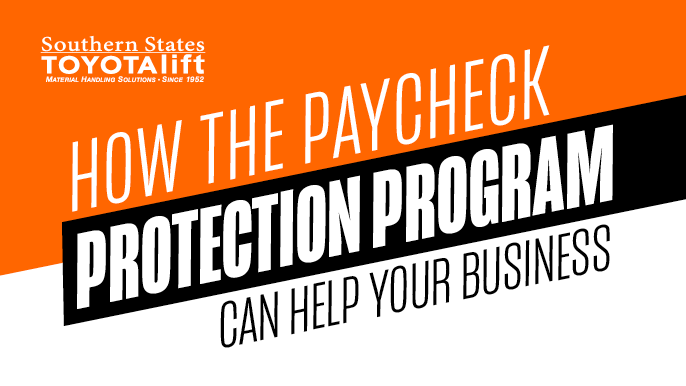How the Paycheck Protection Program Can Help Your Business
by Jenn Zondor, on Apr 8, 2020 2:11:44 PM

The coronavirus pandemic is completely changing life and business as we know it. The team at Southern States Toyotalift knows how challenging this is for businesses and people, and we are here to help you weather the storm.
Our Pandemic Response
To keep our associates and customers safe, the SST leadership team has deployed a comprehensive plan to help reduce risks during the COVID-19 outbreak. These steps include:
- Our associates have been trained and equipped to disinfect units we work on in accordance with CDC guidelines and best practices before and after the service is completed ensuring the safety of your employees and our technicians.
- Wash hands thoroughly every 60 minutes for at least 20 seconds with soap and water.
- No physical interaction policy; forego handshakes and other greetings that require physical contact.
- Maintain a 6-foot distance from each other.
- Self-monitoring and reporting to management daily on medical status and surveying for symptoms
- Where customer interactive tools are traditionally utilized (e.g. electronic signatures on phones/tablets); this is not required until further notice and alternative reviews will be established.
In addition to keeping you safe, we want to do whatever we can to help you get your business through these difficult times. Read on to learn about a federal lending program that may benefit your business.
Small Business Administration (SBA) “Paycheck Protection Program” Overview
This $349 billion lending program is intended to help keep small businesses running and to keep their workers employed. It is modeled after the existing SBA 7(a) program but the loans here are 100 percent guaranteed, as opposed to 75 percent.
Eligibility
The program generally covers:
- small businesses and nonprofits with fewer than 500 employees;
- hospitality businesses with fewer than 500 employees at each location;
- sole-proprietors, independent contractors, and self-employed individuals.
Loan Forgiveness
This program provides loan forgiveness equal to the amount spent on payroll (capped at $100,000 in wages), rent, mortgage interest, and utilities for eight weeks beginning on the origination date of the loan. The loan forgiveness provisions will be reduced in proportion to any reduction in employees and to a reduction in employees’ pay of greater than 25 percent.
Timing
The provisions are retroactive to February 15, 2020, and cover loans from that date to June 30, 2020. The retroactivity provision is intended to encourage rehiring. The SBA will be required to issue implementing regulations within 15 days of the law’s enactment.
Small Business Administration (SBA) “Paycheck Protection Program” Q & A
Q: What can the loan be used to cover?
The loans can be used to cover “payroll costs,” which includes:
- salary, wage, commission or similar compensation (capped at an annual salary of $100,000);
- payment of cash tip or equivalent;
- payment for vacation, parental, family, medical, or sick leave;
- allowance for dismissal or separation;
- payment required for the provisions of group health care benefits, including insurance premiums;
- payment of any retirement benefit;
- payment of state or local tax assessed on the compensation of employees. This definition also covers compensation to or income of a sole proprietor or independent contractor that is a wage, commission, income, net earnings from self-employment, or similar compensation not more than $100,000 in one year.
Q: What documentation must a business present?
An eligible business applying for a loan must certify that:
- the uncertainty of current economic conditions makes its loan request necessary to support the ongoing operations of the business;
- the funds will be used to retain workers and maintain payroll, or make mortgage, lease, and utility payments;
- and the business is not receiving duplicative funds for the same uses as from another SBA program.
Applications are submitted to SBA-approved lenders. SBA will issue the application process within the next few weeks.
Q: Is there loan forgiveness?
Loan Forgiveness Overview – Section 1106
A Paycheck Protection Program loan recipient is eligible for forgiveness of that indebtedness in an amount equal to the amount spent during the eight-week period after the origination date on:
- eligible payroll costs (as noted above, payroll costs do not include any compensation in excess of $100,000)
- interest payments on any mortgage incurred prior to February 15, 2020
- rent payments on any lease in force prior to February 15, 2020
- utility payments for which service began before February 15, 2020.
However, the amount of loan forgiveness shall not exceed the principal amount of the loan. The amount forgiven will also be reduced (proportionally) by:
- any reduction in workforce (as compared to the prior year)
- any reduction in pay of an employee by more than 25 percent (as compared to their prior year compensation).
To encourage employers to rehire any employees who have already been laid off due to the COVID-19 crisis, borrowers that rehire such workers will not be penalized for paying them less when they are rehired.
Other Available Assistance (education/training grants)
Entrepreneurial Development Overview – Section 1103
This section provides grants for education, training, and advising to Small Business Development Centers and Women’s Business Centers (WBC). These grants will help these businesses with:
- education, training, and advising on accessing and applying for resources provided by SBA and other federal resources relating to access to capital and business resiliency;
- the hazards and prevention of the transmission of COVID-19 and other communicable diseases;
- the potential effects of COVID-19 on the supply chains, distribution, and sale of products of small businesses and the mitigation of those effects;
- other risk management practices.
The Act appropriates $265 million for these grants.
State Trade Expansion Program Overview – Section 1104
The State Trade Expansion Program (STEP) makes grants to states to carry out programs that assist eligible small businesses with various issues, including:
- participation in foreign trade missions,
- trade show exhibitions,
- participation in training workshops,
- (4) any other initiative determined appropriate by SBA.
This section allows for federal grant funds appropriated to support the STEP in fiscal year 2018 and fiscal year 2019 to remain available for use through fiscal year 2021. This section also allows for state STEP participants to be reimbursed for events cancelled due to COVID-19, as long as the reimbursement does not exceed the amount of their federal grant.
Waiver of Matching Funds Requirement Under the Women’s Business Center Program – Section 1105
This provision eliminates the non-federal match requirement for Women’s Business Centers for a period of three months.
**Please note there are emergency loans available for nonprofits and private businesses with between 500 and 10,000 employees, but these have additional requirements including that they maintain staffing, pledge not to offshore jobs, abide by collective bargaining agreements with unions, and promise to “remain neutral” if employees seek to form a union during the loan term.
We know how challenging it is to deal with the rapid changes caused by the coronavirus pandemic. If there is anything we can do to help you or your organization, please contact us.
Further Reading:
Southern States Toyotalift Coronavirus Response
Service and Repair for All Forklift Makes & Models
Spring Cleaning - Get Cleaner Floors and Lower Labor Costs








